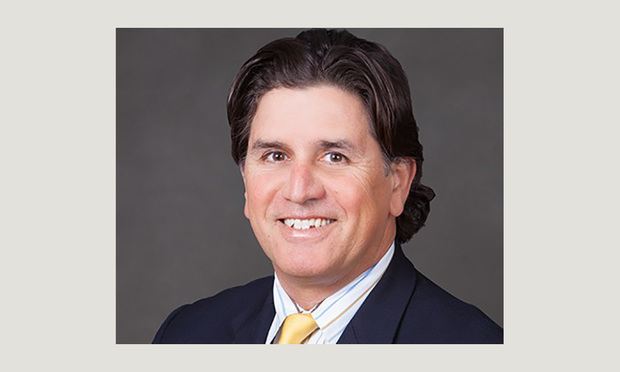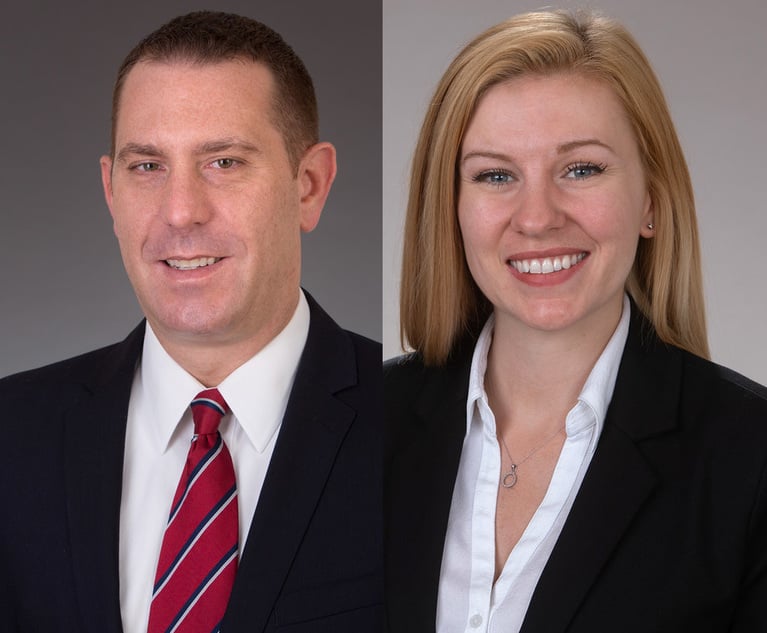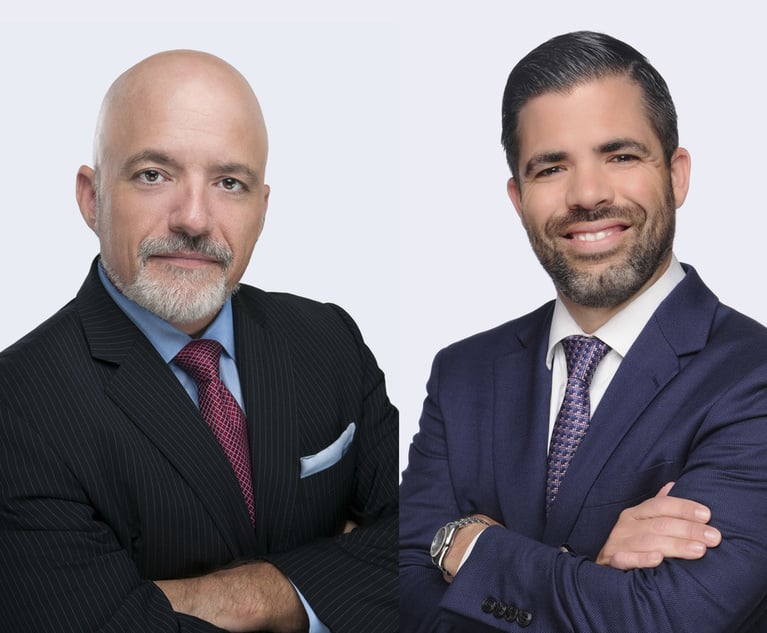Small Business Reorganization Act a Relief to Struggling Businesses During Pandemic
Without this relief, many small businesses would find themselves unable to navigate through Chapter 11 due to the costs and complexity of confirming a plan.
March 30, 2020 at 09:54 AM
5 minute read
 Nicholas Bangos, Of Counsel with Diaz Reus in Miami.
Nicholas Bangos, Of Counsel with Diaz Reus in Miami.The Small Business Reorganization Act of 2019 became effective Feb. 19. The law is designed to make Chapter 11 less expensive and more practical for small businesses and certain individuals whose secured and unsecured debts are no more than $2,725,625. Without this relief, many small businesses would find themselves unable to navigate through Chapter 11 due to the costs and complexity of confirming a plan.
The timing of the passage of this law is of great consequence considering the economic havoc the Covid-19 will reap on small businesses especially those in the travel, hospitality, retail, trade and services sectors upon which Florida relies so heavily. For example, whereas, a restaurant that was forced to shut its doors for one month or a retail store with either no sales or a precipitous drop would typically face an insurmountable hurdle to return to or remain in business, the new law will enable that same restaurant to resume operations or retail location to remain in business and develop a plan to repay either delinquent mortgage payments or rent, wages, salaries, taxes, and vendor debt without requiring the consent of their respective creditors. This crisis will likely motivate creditors to be flexible with their obligors to avoid catastrophic losses.
Unlike the prior Chapter 11, the new subchapter of Chapter 11 eliminates creditors committees, the requirement that the debtor file a disclosure statement, the absolute priority rule and modifies the requirements that the Debtor obtain the vote of at least one impaired creditor class. Creditors committees are designed to promote the interests of a group of creditors and often involve the retention of multiple professionals. The debtor becomes responsible for these fees and costs which adds another layer of expenses.
However, the two most critical changes for businesses pertain to the elimination of the absolute priority rule and modification of creditor voting rights. In order to obtain confirmation of a Chapter 11 plan for a debtor with debts in excess of $2.7-plus million, the debtor is required to obtain the acceptance of the plan by at least one class of creditors whose claims are impaired. If less than all the classes vote in favor of the plan, the debtor must "cramdown" the plan on dissenting creditors. The new law changes the voting and cramdown requirements by providing that so long as the debtor is paying the present value of secured claims and is using all its projected disposable income to pay creditors in a period between three to five years, depending on the length of the plan, the debtor's plan can be confirmed even though there is no accepting class of creditors if there is a reasonable likelihood that that the debtor will be able to make all payments proposed under the plan.
The absolute priority rule, which requires that creditors either receive all of their claim or agree to less before the debtor may receive or retain property, is eliminated. Under the new law, so long as the debtor is using all of its projected disposable income, much like an individual under Section 1129(a)(15), the debtor may pay unsecured creditors less than the full amount of their respective claims and obtain confirmation of its plan without having to inject new value as previously required.
One of the most fundamental powers the bankruptcy code grants debtors is the ability to cure delinquencies and defaults on non-residential leases. The Bankruptcy Code affords a debtor the opportunity to cure defaults in a reasonable period of time. A business either shuttered or otherwise affected by the COVID-19 can breathe a sigh of relief knowing that it can cure lease payments as well as any other defaults over a reasonable time and develop a plan based upon projected future cash flow.
These changes will make Chapter 11 a more viable alternative for businesses for whom Chapter 11 is too expensive and complicated. Legal fees and costs will be reduced in most cases, the process to emerge from bankruptcy will be streamlined and the odds of success will be increased for those who are eligible and avail themselves of this new opportunity to reorganize their financial affairs. For those businesses who were either forced to shutter their doors or saw dramatic decreases in revenue as a result of the COVID-19, the Small Business Reorganization Act offers a panacea to cure and undo the harm associated with the unprecedented disruption of their businesses and help their businesses remain viable.
Nicholas B. Bangos is of counsel with Diaz Reus & Targ in Miami and focuses his practice on bankruptcy and workouts. Contact him at [email protected].
This content has been archived. It is available through our partners, LexisNexis® and Bloomberg Law.
To view this content, please continue to their sites.
Not a Lexis Subscriber?
Subscribe Now
Not a Bloomberg Law Subscriber?
Subscribe Now
NOT FOR REPRINT
© 2025 ALM Global, LLC, All Rights Reserved. Request academic re-use from www.copyright.com. All other uses, submit a request to [email protected]. For more information visit Asset & Logo Licensing.
You Might Like
View All



Law Firms Mentioned
Trending Stories
- 1'Reverse Robin Hood': Capital One Swarmed With Class Actions Alleging Theft of Influencer Commissions in January
- 2Hawaii wildfire victims spared from testifying after last-minute deal over $4B settlement
- 3How We Won It: Latham Secures Back-to-Back ITC Patent Wins for California Companies
- 4Meta agrees to pay $25 million to settle lawsuit from Trump after Jan. 6 suspension
- 5Stevens & Lee Hires Ex-Middle District of Pennsylvania U.S. Attorney as White-Collar Co-Chair
Who Got The Work
J. Brugh Lower of Gibbons has entered an appearance for industrial equipment supplier Devco Corporation in a pending trademark infringement lawsuit. The suit, accusing the defendant of selling knock-off Graco products, was filed Dec. 18 in New Jersey District Court by Rivkin Radler on behalf of Graco Inc. and Graco Minnesota. The case, assigned to U.S. District Judge Zahid N. Quraishi, is 3:24-cv-11294, Graco Inc. et al v. Devco Corporation.
Who Got The Work
Rebecca Maller-Stein and Kent A. Yalowitz of Arnold & Porter Kaye Scholer have entered their appearances for Hanaco Venture Capital and its executives, Lior Prosor and David Frankel, in a pending securities lawsuit. The action, filed on Dec. 24 in New York Southern District Court by Zell, Aron & Co. on behalf of Goldeneye Advisors, accuses the defendants of negligently and fraudulently managing the plaintiff's $1 million investment. The case, assigned to U.S. District Judge Vernon S. Broderick, is 1:24-cv-09918, Goldeneye Advisors, LLC v. Hanaco Venture Capital, Ltd. et al.
Who Got The Work
Attorneys from A&O Shearman has stepped in as defense counsel for Toronto-Dominion Bank and other defendants in a pending securities class action. The suit, filed Dec. 11 in New York Southern District Court by Bleichmar Fonti & Auld, accuses the defendants of concealing the bank's 'pervasive' deficiencies in regards to its compliance with the Bank Secrecy Act and the quality of its anti-money laundering controls. The case, assigned to U.S. District Judge Arun Subramanian, is 1:24-cv-09445, Gonzalez v. The Toronto-Dominion Bank et al.
Who Got The Work
Crown Castle International, a Pennsylvania company providing shared communications infrastructure, has turned to Luke D. Wolf of Gordon Rees Scully Mansukhani to fend off a pending breach-of-contract lawsuit. The court action, filed Nov. 25 in Michigan Eastern District Court by Hooper Hathaway PC on behalf of The Town Residences LLC, accuses Crown Castle of failing to transfer approximately $30,000 in utility payments from T-Mobile in breach of a roof-top lease and assignment agreement. The case, assigned to U.S. District Judge Susan K. Declercq, is 2:24-cv-13131, The Town Residences LLC v. T-Mobile US, Inc. et al.
Who Got The Work
Wilfred P. Coronato and Daniel M. Schwartz of McCarter & English have stepped in as defense counsel to Electrolux Home Products Inc. in a pending product liability lawsuit. The court action, filed Nov. 26 in New York Eastern District Court by Poulos Lopiccolo PC and Nagel Rice LLP on behalf of David Stern, alleges that the defendant's refrigerators’ drawers and shelving repeatedly break and fall apart within months after purchase. The case, assigned to U.S. District Judge Joan M. Azrack, is 2:24-cv-08204, Stern v. Electrolux Home Products, Inc.
Featured Firms
Law Offices of Gary Martin Hays & Associates, P.C.
(470) 294-1674
Law Offices of Mark E. Salomone
(857) 444-6468
Smith & Hassler
(713) 739-1250






